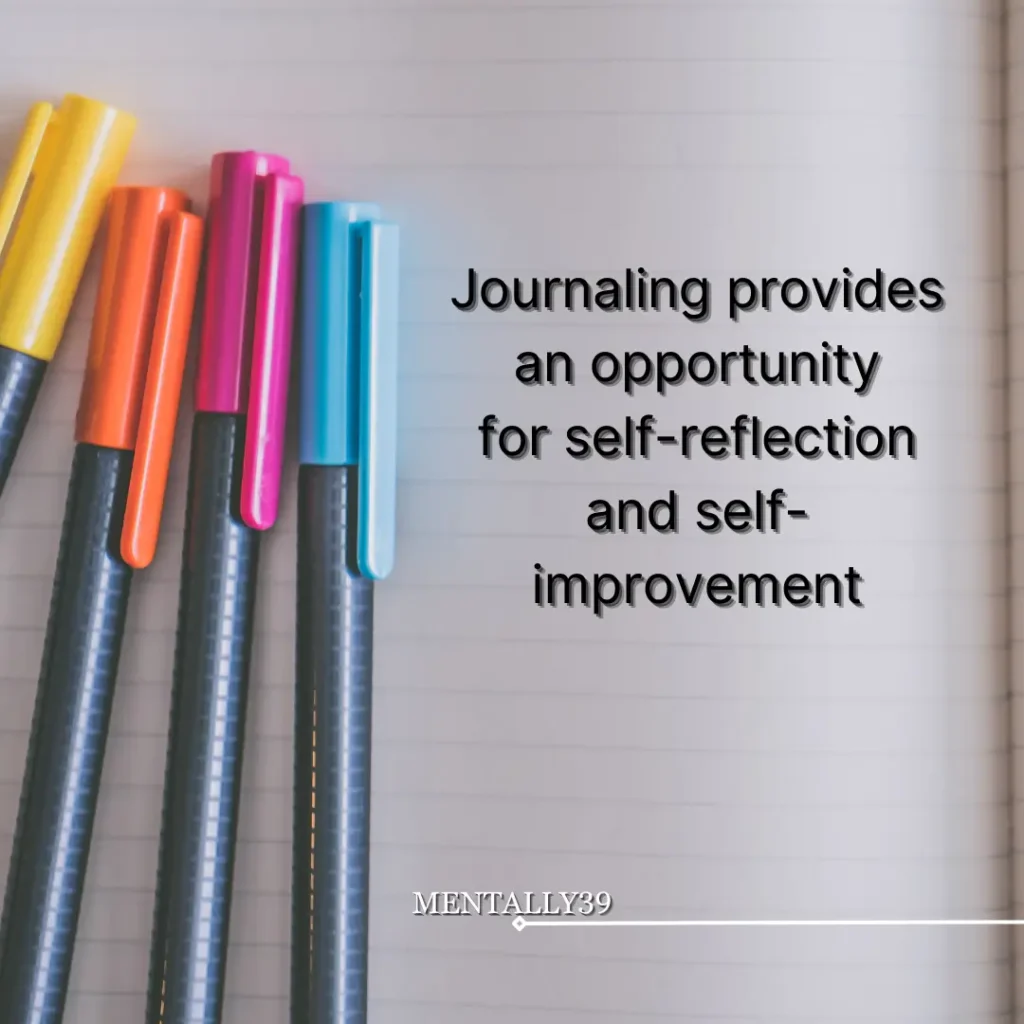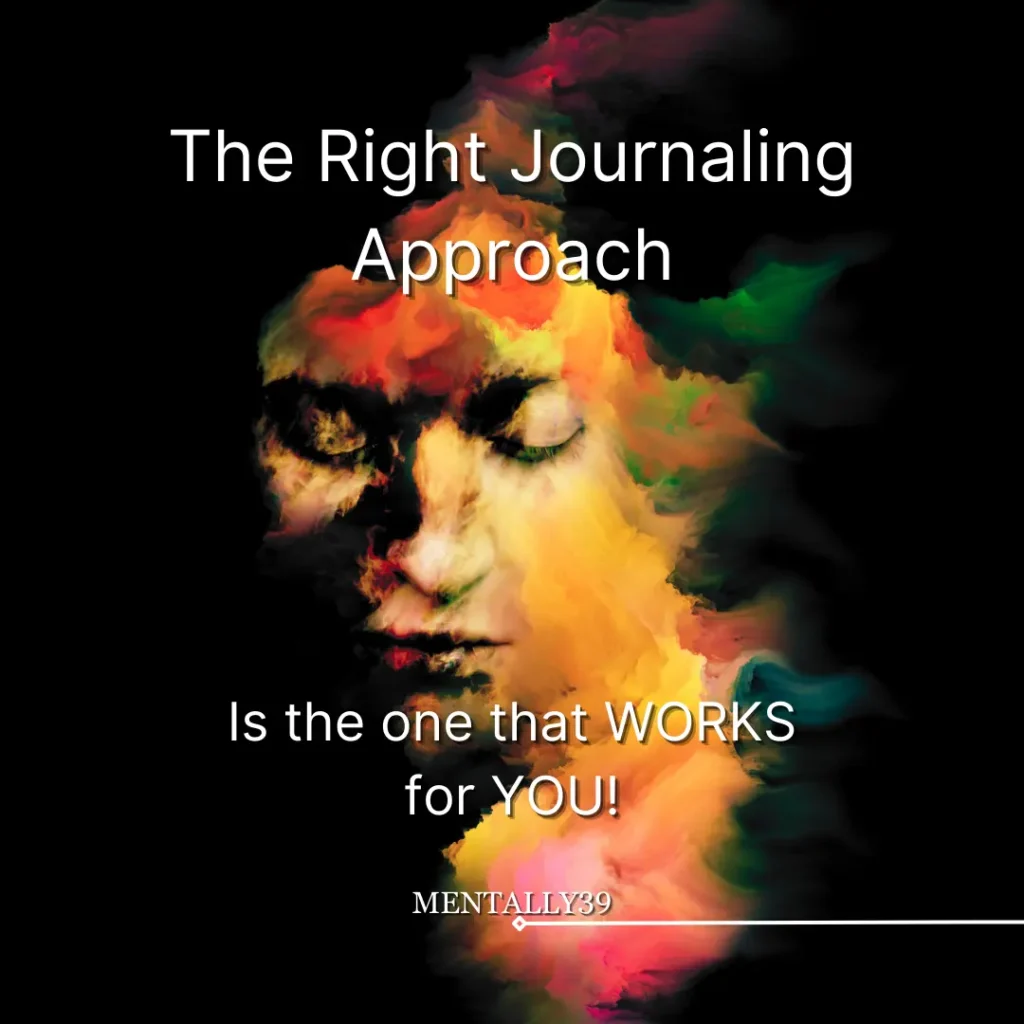To support this website, please check out Monkmanual and save 15% when you use code Mentally39
Did you know that journal writing can help your mental health? It’s true! This simple activity can make you feel better and help you deal with tough emotions.
I would have never thought journaling for mental health would have impacted me the way it did. It has had such an amazing impact on my mental health. Journaling may help you, too; just the act of writing can be calming. And as the title says, it’s private. So, what happens when you write in your journal? Let’s take a closer look.
Table of Contents
Key Takeaways:
- Journaling is a powerful habit that can positively impact your mental health.
- It provides stress relief, aids in emotional regulation, and promotes self-awareness.
- Mindful journaling techniques can enhance its benefits, such as non-judgment and exploring positive thoughts.
- Getting started with journaling is easy – just set aside a few minutes each day to write down your thoughts or feelings.
- Journaling is a valuable tool for self-reflection, self-improvement, and managing mental health conditions.
Journaling for Mental Health Benefits
Why is journaling good for mental health? It gives you a safe space to write down your worries and helps you feel less stressed. Studies have shown that writing things down can make you feel happier and less anxious.
When you start journaling for mental health, you will find that it helps you manage your emotions. When you write down how you’re feeling, you can start to understand your feelings better, thus gaining a better understanding of yourself. Which leads you to be aware of your thoughts and feelings.
Deeper self-awareness is an essential piece of positive mental health outcomes. When individuals understand themselves on a deeper level, they gain the ability to build resilience and improve relationships with others. Journaling simplifies this process by helping individuals recognize patterns, triggers, and areas for personal growth.
| Advantages of Journaling | |
|---|---|
| Stress Relief | Share your worries with a blank piece of paper and feel better. |
| Emotional Regulation | Process difficult emotions and decrease depressive symptoms |
| Deeper Self-Awareness | Acknowledge thoughts, feelings, and triggers for personal growth |

Mindful Journaling
Keeping a journal with a mindful approach can help us become more aware of our beliefs and feelings. It can also help us stay focused on the present moment. By keeping an open mind and writing about positive things, we can improve our journaling technique and feel better overall.
Create a Safe Space
When you use your journal, be mindful; finding a place where you feel comfortable and at ease is important. You don’t want to try and improve your mental health, where you can be easily distracted.
Doing so in a safe environment will help you express yourself freely without worrying about being judged or overthinking things. So, choose a quiet and cozy spot where you can be yourself and let your thoughts flow.
Be Present and Mindful
When journaling, it’s essential to maintain your focus and avoid distractions. Taking deep breaths and relaxing can help you think clearly and better understand yourself. You can create a space that promotes clarity and self-reflection by staying centered.
Embrace Non-Judgment
When you’re journaling for mental health, it is important to treat yourself with kindness. Avoid being too harsh on yourself or judging what you write or feel. Instead, allow yourself to express them honestly and without fear. Remember, your journal is a secure space where you can explore your thoughts and feelings without worrying about other people’s opinions.
Explore Positive Thoughts
When you’re journaling for mental health, try to focus on good thoughts instead of bad ones. Think about things that make you happy and grateful, and write them down. This can help you feel more positive and happy.
Observe Patterns
When you write, pay attention to things that happen again and again. Notice if you think or feel the same things a lot or if certain things make you feel a certain way. Knowing these things can help you learn about yourself and make changes to be a better person.
Practice Kindness and Gentleness
When you write in your journal, try to be kind and patient towards yourself. Don’t criticize or judge yourself harshly, and prioritize self-care. Journaling can help you learn more about yourself and improve your overall well-being. By following these tips, you can gain a deeper understanding of your thoughts and feelings and grow as a person. Writing can also help you focus on the present moment and improve your mindfulness, so don’t worry about spelling, grammar, or punctuation. Just let your thoughts flow freely.
Getting Started with Journaling for Mental Health
Beginning to use journaling as a routine can seem daunting, but it doesn’t have to be. You can start the change toward improved mental health and self-discovery with a few simple steps.
Start Small
If you’re worried about writing a lot in your journal, don’t be. Just try writing one sentence every day. It’s an easy way to start and can help you get into the habit of journaling without feeling overwhelmed.
Set Aside Journaling Time
Pick a time during the day that works best for you to write. You can choose either morning or evening. The most important thing is to stick to the same time every day. This will help you create a journaling habit, which is a good thing.
Choose Your Journaling Method
Consider whether you like writing with a pen and paper or using a computer or phone. Try both ways to see which one you like best. Remember, the best way is the one that makes you feel good and lets you write whatever you want. I started just writing on whatever piece of paper was lying around, then transitioned to a nice moleskin journal, which I still use.
Utilize Journaling Prompts
Prompts can be incredibly helpful if you are faced with writer’s block or unsure what to write about. They provide guidance and direction for self-reflection. Here are a few prompts to get you started:
- What am I grateful for today?
- What are three things I want to accomplish this week?
- What challenges did I overcome today, and how did I handle them?
Again, explore online resources or books for an extensive list of prompts that align with your interests and goals. If you really want to experience journaling benefits, look up prompts for mental health journaling on the Day One blog, such as anxiety and depression, addictions, trauma, and other traumatic events.
If nothing else, write a letter about your condition, address it, put it in an envelope, file it away, or maybe do a ceremonial burning to signify your release. Utilize prompts for better mental health, such as those focused on negative emotions, challenges, and self-care practices.
Enhance Your Practice
To deepen your journaling experience, consider incorporating expressive writing and gratitude journaling. Expressive writing involves pouring your emotions and thoughts onto the page without censorship or judgment. It can help release pent-up feelings and promote emotional well-being.
On the other hand, a gratitude journal focuses on exploring and appreciating the positive aspects of your life. Each day, write down three things you are grateful for. This practice cultivates a sense of gratitude and shifts your focus towards positivity.
By following these tips for journaling, you can see how it will affect your self-reflection, personal growth, and improved mental and physical health.

Journaling good for mental health?
Journaling serves as a valuable tool for self-reflection and self-improvement. By documenting my thoughts, feelings, and experiences, I gain the opportunity to understand myself better and identify patterns in my moods, thought processes, and behaviors.
Through journaling, I can set personal goals and track my progress towards them. Whether it’s improving my habits and behaviors or working towards achieving specific milestones, journaling provides me with a means to measure my growth and make positive changes in my life.
By consistently journaling, I gain insights into myself that help me cultivate a greater sense of self-awareness. I become more attuned to my emotions, triggers, and strengths, allowing me to navigate life with a deeper understanding of myself. This self-awareness is crucial for personal growth and improvement.
Self-Reflection and Self-Improvement through Journaling
- Track progress toward personal goals.
- Identify patterns in moods and behaviors.
- Enhance self-awareness and self-discovery.
- Improve habits and behaviors.
- Cultivate a positive mindset.
- Foster personal growth and development.
Journaling also provides me with a safe space to explore my thoughts and emotions. It allows me to process difficult experiences, gain clarity, and find solutions to challenges I may be facing. Reflecting on my journal entries, I can gain valuable insights and learn from past experiences.
Regarding self-improvement, journaling acts as a reliable companion on my journey. It helps me stay accountable and motivated as I work towards achieving my personal goals. Whether it’s developing healthy habits, overcoming obstacles, or making positive changes in my life, journaling supports me every step of the way. It’s like talking to your dog; it listens and doesn’t judge.
Ultimately, journaling empowers me to become the best version of myself. It keeps me focused, mindful, and proactive in pursuing personal growth and self-improvement. By harnessing the power of self-reflection through journaling, I can create positive changes that enrich my life and lead to lasting transformation.
Journaling for Mental Health Conditions
Journaling can be a strong intervention for individuals managing mental health illnesses such as depression and anxiety. It provides a safe and private space to process thoughts, emotions, and feelings, offering a therapeutic outlet for self-expression.
Through journaling, individuals can alleviate mental pain and cultivate emotional well-being. It allows them to explore their innermost thoughts and experiences, gaining clarity and insight into their mental state.
Studies have shown that journaling as an intervention can have positive effects on individuals with mental health concerns. By incorporating journaling into their treatment plan, individuals have the opportunity to effectively manage their mental health and experience overall improvement in their well-being.
Journaling acts as a form of self-reflection and self-compassion, enabling individuals to understand their needs and triggers better. It serves as a tool for personal growth, fostering resilience and empowering individuals to take control of their mental health journey.
The Effects of Journaling as an Intervention
Researchers have found that engaging in regular journaling can lead to a range of positive outcomes for individuals with mental health disorders:
| Journaling as an Intervention | Examples |
|---|---|
| Emotional Release | Journaling provides an outlet to express and process intense emotions and experiences, helping individuals find relief from mental distress. |
| Self-awareness | By reflecting on their thoughts and emotions, individuals can better understand themselves, identifying patterns and triggers that impact their mental health. |
| Thought Challenge | Journaling encourages individuals to critically examine and reframe their negative thought patterns, promoting more positive thinking and reducing depressive symptoms. |
| Stress Reduction | Writing down worries and anxieties can help individuals externalize their thoughts, providing a sense of relief and reducing overall stress levels. |
| Positive Coping Strategies | Journaling can serve as a platform for individuals to explore and develop positive coping strategies, empowering them to navigate challenging situations more effectively. |
Writing in a journal can help people take care of their mental health. It can be used together with other treatments, providing extra support and a way to see how much progress is being made. Journaling is a great way for people who want to take care of their mental well-being in a healthy way. It is private and can be done easily on your own, and it helps people learn more about themselves and make progress in managing their mental health.

Choosing the Right Journaling Approach
When it comes to journaling, there are various approaches to choose from. Finding the one that resonates with you and enhances your journaling experience is important. Let’s explore some popular journaling approaches:
Bullet Journaling
Bullet journaling is a structured and organized approach to journaling. It involves using symbols and a specific format to record tasks, events, and thoughts. Utilizing a bullet journal can efficiently track your progress, set goals, and prioritize tasks. The flexibility of this approach allows you to personalize it according to your needs and preferences.
Expressive Writing
Expressive writing is a powerful approach that focuses on exploring your emotions and feelings. Through writing freely and authentically, you can gain clarity, release pent-up emotions, and gain a deeper understanding of yourself. Graphic writing can be a therapeutic practice that helps you process difficult emotions and enhance self-awareness. If you have an artistic side, include some drawings or doodles to express yourself.
Daily Journaling
Daily journaling is a good habit to help you think about your thoughts and feelings. It can help you become a better version of yourself. When you write daily, you habitually check in with yourself, track your progress, and make positive changes.
Ultimately, the best journaling approach is the one that aligns with your personality, goals, and journaling experience. Experiment with different approaches and find what works best for you. Whether bullet journaling, creative writing, gratitude journaling, or another type of journaling, such as reflective journaling or stream of consciousness, or a particular format that feels right to you, the key is finding joy, inspiration, and personal growth through your journaling practice.
Conclusion
The benefits of journaling for mental health become a powerful and private habit that promotes emotional resilience and self-discovery, leading to improved health outcomes. Through the act of journaling, I have found a safe space for self-expression, allowing me to manage stress, regulate my emotions, and enhance my self-awareness in response to stressors.
Additionally, journaling for stress management has been linked to an increased likelihood of seeking out and receiving social support, further aiding in emotional healing and resilience to stress. The benefits of journaling for stress management and emotional healing, including the potential for increased social support, far exceed the minimal cost involved.
By regularly engaging in journaling, I have experienced the benefits it brings to my mental health. It has become a tool for reflection, growth, and self-improvement, allowing me to better understand myself and my emotions.
Whether I adopt mindful journaling techniques, such as non-judgment and exploration of positive thoughts, or commit to a regular journaling practice, I find that journaling helps me navigate life’s challenges with greater clarity and resilience into adulthood.
Journaling has proven to be invaluable, not only for individuals like me who seek personal well-being but also for those with mental health conditions. It provides a means to process thoughts and emotions, relieving mental distress and fostering emotional well-being. T
he power of journaling for mental health is backed by research, highlighting its positive effects when incorporated into treatment plans for mental illness, making it a crucial component of psychotherapy.

20+ Years as a Special Education Teacher
NASM Certified Nutrition Coach,
Certified Trauma Informed Trainer
Mindset and Motivation Master Life Coach
